Poor People’s Campaign Would Have Cheered Robert Kennedy
As we mourn the killing of RFK, his message of economic justice from 50 years ago could not be more relevant today.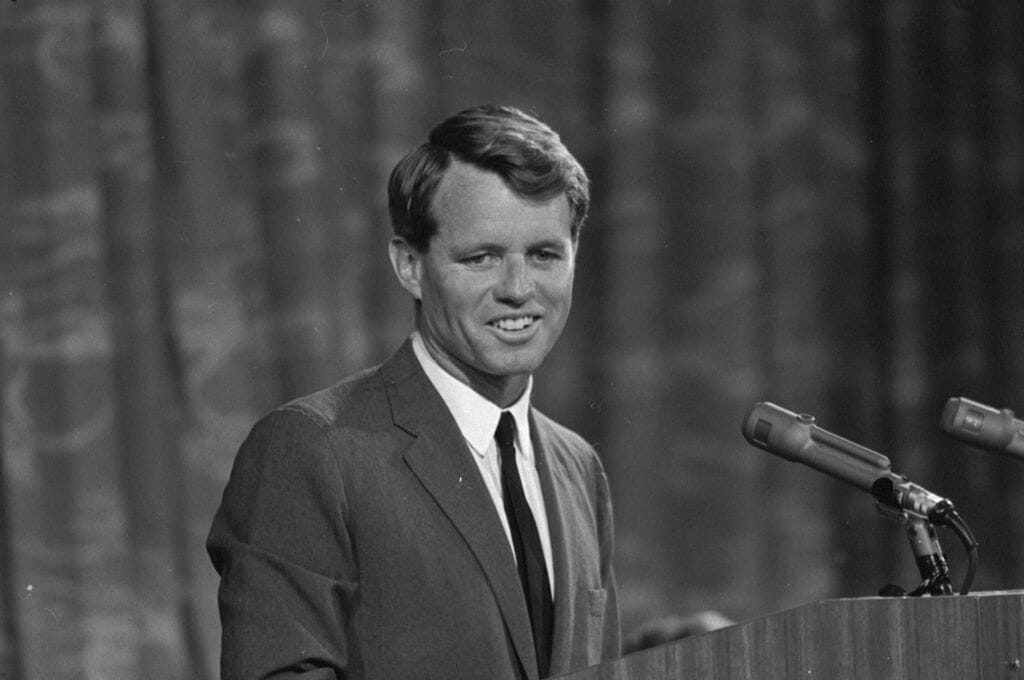 Robert F. Kennedy in 1964. (Warren K. Leffler / Wikimedia)
Robert F. Kennedy in 1964. (Warren K. Leffler / Wikimedia)
This month, two events combine to remind me of my early days in Washington, D.C., my work for Robert F. Kennedy, and my recollection of the Poor People’s March on Washington in March 1968, led by the Rev. Martin Luther King Jr. and other leaders of poor people’s organizations to gain economic justice. That event was only months before King and Kennedy were killed by the gunfire of deranged murderers.
Later that year, near Christmas, I wanted to buy my law partner a gift. I went to the Georgetown gallery that was Sister Mary Corita’s exclusive store in Washington. I was a fan of the social activist Catholic nun’s work on silkscreen, usually on themes of peace and justice, affordable pop art. It being a quiet day, the owner took me around his shop to discuss possible purchases. Nothing struck me as right for her, so he asked, “What is his background? Does he like Robert Kennedy?”
“She’s a she,” I replied, “and she probably does, but I worked for him, so I certainly am a fan. Why do you ask?”
“Then I have the perfect poster for you,” he said, and directed me to the back of his shop, where he pointed to the poster shown below.
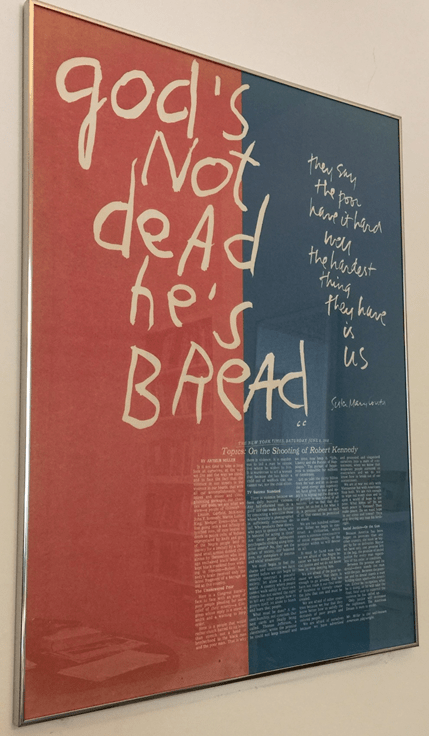
It was perfect, a Mary Corita I loved, including a dated (June 8, 1968) New York Times op-ed by the eloquent playwright Arthur Miller, with a message about my former boss and the millions of poor people in America that resonated. Sister Mary’s signature was painted in small white script on the red-and-blue poster. Above her name, she had printed in her typical informal script: “god’s not dead he’s bread,” and alongside that script, “They say the poor have it hard well the hardest thing they have is us.” Rushed the creation surely was, but brilliant nonetheless.
“I must have it,” I said. “I may not give it to my partner, but I would love to have it.”
“It is the only one I have,” he replied, “and I will give it to you because it is priceless.”
Then he told me this story about the origin of the poster.
“The Poor People’s Campaign had commissioned Sister Mary to create a poster for their use when they came to Washington. She was in town, and we were having breakfast in a neighborhood restaurant when the campaign leaders came in looking for Mary. When they approached us, asking where the posters were, she lied, “I have them in the shop and will bring them to you this afternoon.”
That arranged, they left, and I looked at her, puzzled. “In my shop?” I said.
Mary confessed, “I totally forgot. What shall I do?”
“We finished our breakfast quickly, hurried to my store, and I put up a ‘closed’ sign on the door, and we went into the back room, cleared a long table, and Mary went to work. We cut up a poster-sized sheet, half in read, half in blue. She had a copy of The New York Times op-ed by Arthur Miller—“On the Killing of RFK”—and we cut it out and pasted it onto the bottom of the poster. She did her characteristic brush stroke legends, and we hurriedly ran off 500 copies that she took to the campaign managers.”
“Where are the others now?” I asked.
“They all were lost, some trampled in the mud at their campsite, some may have been taken as mementos, and this is the only one I kept, so I saved it.”
He gave it to me and wouldn’t take any payment. He thought it was the perfect, priceless gift waiting for the perfect person to have it. I did buy another poster to compensate him for his generosity, and reluctantly gave the poster to my partner, who agreed years later that it should be mine and gave it back to me. It has been on my wall ever since.
Miller asked these questions in 1968, and sadly, we must ask them again, half a century later. As we mourn the killing of RFK, who knew the plight of people in the ghettos and on farms and reservations, and had their trust, the new Poor People’s Campaign for economic justice reminds us that the disparity between rich and poor in America has widened.
King, Kennedy and Miller, each grand in their work, are dead. But each of their dated messages could not be more relevant today.
Your support matters…Independent journalism is under threat and overshadowed by heavily funded mainstream media.
You can help level the playing field. Become a member.
Your tax-deductible contribution keeps us digging beneath the headlines to give you thought-provoking, investigative reporting and analysis that unearths what's really happening- without compromise.
Give today to support our courageous, independent journalists.

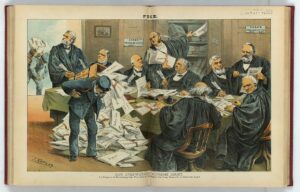
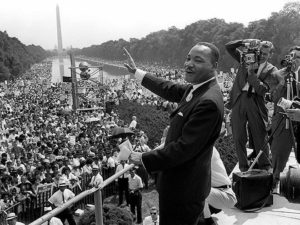
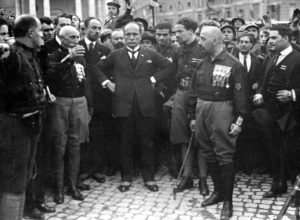
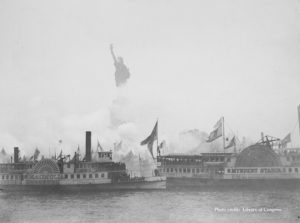

You need to be a supporter to comment.
There are currently no responses to this article.
Be the first to respond.